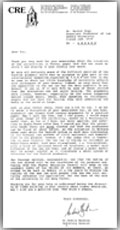 CRE CRE
Standing Conference of Rectors, Presidents and Vice-Chancellors of the European
Universities
(Conférence permanente des recteurs, présidents et vice-chanceliers des universités
européennes)
Dr. Nurkut İnan
Associate Professor of Law
Ankara University
Cinnah cad. 27/9
TR - ANKARA
Dear Sir,
Thank you very much for your memorandum about the situation of the universities in Turkey,
paper that did not reach me while I was staying in your country last month.
We were all certainly aware of the difficult position of the Turkish academic world when
we accepted to take part in the international symposium organised by T.U.R.K* and that is
why we came to share our little knowledge university affairs with colleagues of your
country. Indeed, we were sorry that the position to the law was not more explicit in our
debate: it was as if it were felt by some of those invited that the discussion was not
worth joining. The arguments were lively, however, especially as the event happened behind
closed doors, where, when speaking to colleagues, people did not have the feeling they
were addressing the media or the world at large.
And, as your letter shows, there was a lot to say. Iam not to enter a discussion of your
memorendum for, as you know, academics can always find counter-arguments to a position
paper. MayI just say that, had I the place, I would argue on your image of the
university, based on a Rousseauist model that, as far as I know, was never applied,
andrefering to Anglo-Saxon rules (may I remind you that the university heads there are never
elected and that the professors can be fired at short notice, as the situation in Britain
shows now) while the Turkish system is much more continental in its history (an academe of
civil servants) and Humboldtian in its purpose. Indeed, if I may judge what is happening
in your country, the new law is trying to introduce an Anglo-Saxon model, much more
streamlined, i.e. hierarchical, with a kind of national board of trustees, a model very
different of the one you knew, and of course a model difficult to accept insofar as it
transforms a whole system of reference for the the Turkish academics.
Our foreign opinion, consequently, was that the making of new system will be the
touchstone of its purposes and, hoping that the Higher Education Council will keep to the
academic roots of two thirds of its members, at least, we wished to be back in Ankara in a
few years to discuss the reality of the new law with people like you who will certainly
influence its application, for the best of the work of the university in its many facets.
Thanking you for your help to understand better thediversity of views existing in your
country about higher education, may I wish you a positive year 1982 while I remain,
Yours sincerely,
Dr Andris Barblan
Secretary general
Geneva, 20 January 1982
*T.U.R.K. Türk Üniversite Rektörleri Konseyi. |

